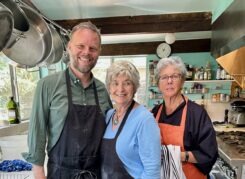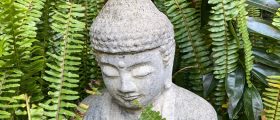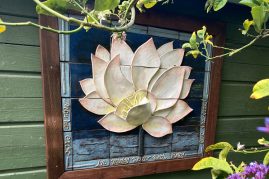Inspired by Dogen Zenji’s Instruction for the Tenzo
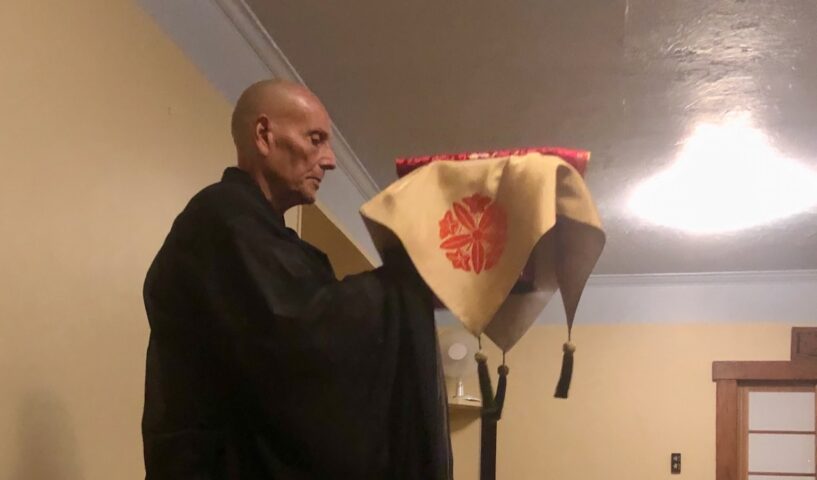
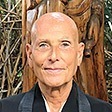 by Jonathan Kaigen Levy
by Jonathan Kaigen Levy
Let us reflect on the efforts that brought us this food and consider how it comes to us. Reflect on our virtue and practice, and whether we are worthy of this offering. Regard greed as the obstacle to freedom of mind. Regard this meal as medicine to sustain our life. For the sake of enlightenment, we now receive this food …
Thus begins the meal gatha, an inspiration to us all to take time to reflect on the many efforts that have gone into making our life possible. It’s also the jumping off point for a story of how I became a tenzo, a zen temple cook.
In 2009, I got a call from my doctor asking me and my wife to meet with him in his office. What happened next changed the course of my life. A recent scan revealed a very aggressive form of prostate cancer that had already spread; and that with medication, I might possibly live for a few more years. The news struck like a bolt; we were dazed.
Fifteen years later, he obviously got it wrong. But at the time, I didn’t know what to do, or where to turn, I just knew I needed help. And help came quickly. Friends told me about a group of fellow cancer patients who used guided meditation to relax and gain equilibrium in facing their cancers. Sitting with them was a blessing.
Earlier in my life, I had read a few books on Zen and sat zazen while training in karate. So, I was intrigued when a group member just out of the blue suggested that I go see Roshi Egyoku at the Zen Center of Los Angeles. In hindsight, I realize a dharma gate opened, and life took a turn. The following week I entered through the gate of Buddha Essence Temple and sensed that I had arrived home.
During my first meeting with Roshi, she caught me by surprise with what turned out to be my first koan: “You probably don’t even know who you are.” That single phrase has guided me throughout my years of practice, encouraging me to never let up questioning the very core of my being.

I sat zazen, attended services, participated in numerous sesshin, and began thinking about how to deepen my practice through service to the Sangha. Since I had always enjoyed cooking, why not cook? I started preparing and serving Sunday lunches at the Zen Center, and that was how my training as a tenzo began.
And, once I discovered Dogen Zenji’s Tenzo kyokun; Instructions for the Tenzo, it became my bible, opening my eyes to the spiritual aspect of training as a tenzo, and guiding me through my years of service.
Tenzo kyokun actually derives from The Chanyuan Qinggui, Rules of Purity in the Chan Monastery, compiled in 1103, and states: Put your awakened mind to work, that will enable everyone to practice with their bodies and minds with the least hindrance.
Master Dogen added: Although the work is just that of preparing meals, it is in spirit different from the work of an ordinary cook or kitchen helper. The tenzo prepares meals for the Three Treasures.
The difference is that tenzo practice, according to Master Dogen, demands the utmost attention to detail, and requires a mind that is in tune with practice:
Get the rice, vegetables, and other ingredients; he must handle them as carefully as if they were his own eyes. The tenzo should handle all food he receives with respect, as if it were to be used in a meal for the emperor. Do not be absent-minded in your activities, cultivate a spirit which strives to increase the source of goodness upon the mountain of goodness. Those who have come before us have said, “The Way-Seeking Mind of a tenzo is actualized by rolling up your sleeves.”
I took Dogen Zenji’s words to heart and threw myself into tenzo practice like my life depended on it. I cooked for every sesshin, planning the menus, doing the shopping, and as time passed, I discovered that I really enjoyed preparing oryoki style meals. The ritual, the chanting, the meticulous attention to detail, all combined into what was a profound centering experience.
Once the meal was ready to serve, we did nine bows during our kitchen service, then rang the Umpan, or “cloud plate”, signaling that it was time to come and eat. The tenzo serves delicious vegetarian meals, so that participants will have all the nutrition and energy they need to keep going, especially while sitting through long sesshins.
The Way-Seeking Mind of a tenzo is actualized by rolling up your sleeves.
The tenzo works closely with an assistant, and I have worked with what I consider some of the best. Starting with Taikan, who easily surpassed being “just an assistant” and became a real tenzo partner, I also worked with Kai- zen, Enduring-Vow, and many others to prepare meals. I am so grateful to them all. It was a totally joyful collaboration.
As tenzo, you must keep a steady hand, and an uncluttered concentration. Even though you try your hardest to make sure all the details are in place, you must always expect the unexpected at the most inconvenient times.
Dogen Zenji reminds us: When you have finished washing the rice, put it into the cooking pot. Take special care, lest a mouse accidentally falls into it. Under no circumstances allow anyone who happens to be drifting through the kitchen to poke his fingers around or look into the pot.
We never had a mouse, but occasionally someone would try to peak in the pot. I remember the time we fell
a little behind schedule. We were still cooking the food when we happened to glance up to see that the sesshin participants had finished zazen and were already starting to enter the dining hall for lunch. Oy… you can’t imagine the panic!
Maybe they heard our commotion, and maybe they didn’t, but once we recovered our composure, and calmly walked in with the meal, no one batted and eye; they just ate lunch with gusto.
In the Tenzo kyokun, Master Dogen reminds us of what he calls “the three minds of the tenzo,” joyful mind, paren- tal mind, and magnanimous mind:
How fortunate we are to have been born as human beings
given the opportunity to prepare meals for the Three Treasures. Our attitude should truly be one of joy and gratefulness. To view all things with this attitude is called Kishin (Joyful Mind).
In the same way that a parent cares for an only child, keep the Three Treasures in your mind. A parent, irrespective of poverty or difficult circumstances, loves and raises a child with care. In this same manner, when you handle water, rice, or anything else, you must have the affectionate and caring concern of a parent raising a child. This is the mind of Rōshin (Parental Mind).
How fortunate we are to have been born as human beings.
Daishin (Magnanimous Mind) is like a mountain; stable and impartial. Exemplifying the ocean, it is tolerant and views everything from the broadest perspective. The many rivers which flow into the ocean become the one taste of the ocean; when they flow into the pure ocean of the dharma there are no such distinctions as delicacies or plain food, there is just one taste, and it is the Buddha dharma. In cultivating the germ of aspiration to live out the Way, as well as in practicing the Dharma, delicious and ordinary tastes are the same and not two. There is an old saying, “The mouth of a monk is like an oven.” Remember this well.
Our meal gatha ends: Thus, we eat this food with everyone. We eat to stop all evil, to practice good, to liberate all beings, and to accomplish the Buddha Way.
My story ends here, but I would like to encourage you all to take up the practice of tenzo. Zazen doesn’t just take place in the zendo. It carries on in the kitchen, the toilet, and throughout the entire universe, with no separation anywhere.
Please remember the words of Master Hyakujō: “A day without work, is a day without food.” So, don the apron, sharpen a knife, and wash the rice; get to work serving the Three Treasures. Work hard as a tenzo, just like Dongshan and Guishan did; then you too will realize how to cook your life.
Sensei Kaigen served on the ZCLA Tenzo Circle for many years.

